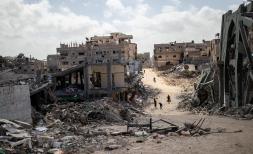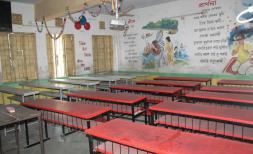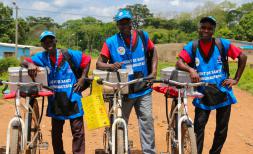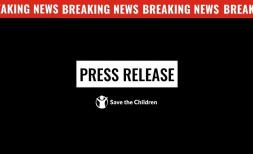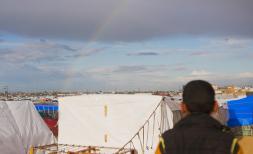BASRA, IRAQ: Living in ‘one of the hottest places on earth’ – Photo essay shows how children survive drought, water shortages
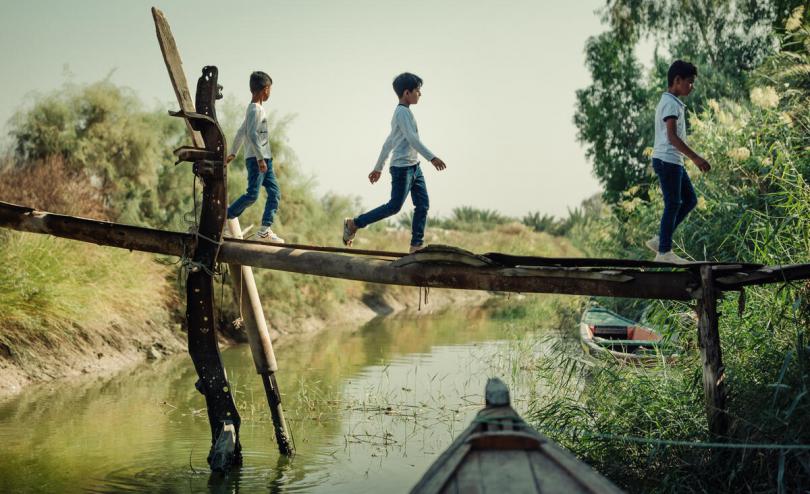
[Children in Abu Al-Khaseeb governorate, southern Iraq. [Emily Garthwaite/Save the Children]
BASRA, IRAQ, 23 November 2023 – Children living in one of the hottest places on earth say rising heat and water shortages are impacting their lives daily, with award-winning photographer Emily Garthwaite documenting their stories ahead of the COP28 summit.
Children living on the frontline of the climate crisis in southern Iraq’s governorate of Basra explain how drought and heatwaves on top of decades of conflict have forced their families to abandon farming after generations and how they fear for their futures.
Emily Garthwaite travelled to Basra to meet children and families whose livelihoods have been affected and to find out how they are coping.
Iraq is the fifth most vulnerable country to water and food shortages and extreme temperatures, according to the United Nations. Drought has destroyed farmland in rural areas like the Abu Al-Khaseeb district in Basra, leaving communities with no income. As the drought worsens, more livestock — often a crucially important source of income for rural families — fall ill and die, forcing thousands of people to be displaced multiple times.
More than 130,000 families have been displaced in Iraq as a result of drought, according to the International Organisation for Migration. Projections show that Iraq is expected to be the ‘hottest’ country in the region by 2050, with average temperature exceeding 36 degrees Celsius (96.8 degrees Fahrenheit).
Families in southern Iraq have faced a combination of shocks over the years including an environment damaged by years of conflict and the impacts of climate change such as rising sea levels, sandstorms, heatwaves and droughts. This ‘perfect storm’ has impacted the quality of life of thousands of children. Child poverty rates are significantly higher in rural areas where children dependent on agriculture for their livelihoods are disproportionately affected by risks such as child labour. About 10% of children between 5-14 years old in these areas are engaged in child labour, as opposed to 30% in urban areas. The number is set to rise as a result of climate displacement and crop failure.
These are the stories of three families trying to adapt to the climate crisis in Iraq.
Ahmed’s* story: “If our animals continue to die, I might have to drop out of school.”
A portrait of Ahmed*, 14 [Emily Garthwaite/Save the Children]. More images here
Ahmed*, 14, lives in Abu Al-Khaseeb with his family of five. His family has been displaced twice: first due to armed conflict in the 1990s and more recently due to the climate crisis. They originally worked in agriculture and livestock, but Ahmed’s* father said their animals died due to the intrusion of salt water into their lands, which also damaged their date palms, okras and other crops. The family hasn’t cultivated their lands for two years and is now struggling to make ends meet.
Ahmed* said:
“I’m worried about my future. If this situation continues, I might have to drop out of school to support my family. My dream is to become an engineer, fix the water issue and build houses for the poor.”
Wassan’s* story: “We used to plant dates and pomegranates, but now they’re all gone.”
Wassan* and her siblings [Emily Garthwaite/ Save the Children]. More images here
Wassan* is a 9-year-old girl who lives in the outskirts of Abu A-Khaseeb, with her father and her five siblings. Job opportunities are very limited, and their home is in an informal settlement, with limited access to services. Her father Musleh* mainly works as a daily labourer after leaving the agricultural farming business passed on through three generations. He was diagnosed with leukaemia but he’s the breadwinner of his family so must continue working.
Wassan* said:
“In our farm we used to plant dates, pomegranates, and other vegetables and fruits. This was back then, when there was water, but now they are all dying. They say it’s because it’s not raining.”
Musleh *said:
“I’m working as a daily labourer now, which is very tiring. We receive water every other day for around two hours. It is barely enough for us to drink and wash our clothes. We can’t start any farming with that water. We need support to desalinate the water from the Gulf, otherwise, we will all have to leave this place”.
Haidar’s* story: “It makes me sad when I see our farm and animals die. They say it’s the water. At school, they don’t speak about these issues, but they are all around us.”
Haidar* and his family [Emily Garthwaite/ Save the Children]. More images here
Haidar* is aged 10 and lives in Abu Al-Khaseeb where his grandfather owns a date farm and raises animals for dairy products and breeding. Haidar* and his family of five live in the same household as his grandparents.
Haidar’s* father works as a taxi driver following the death of their animals that used to drink saline water. Haidar* said he had to bury the dead animals with his grandfather and that the family continues to struggle financially due to drought.
Haidar* said:
“It makes me sad when I see our farm and animals die. They say it’s the water. At school, they don’t speak about all these surrounding issues. When I grow up, I hope to become a teacher, and I will speak about these problems, because they are all around us”.
ENDS
Emily Garthwaite is an award-winning British photojournalist, writer, Leica Ambassador and storyteller focusing on environmental and humanitarian stories. Her work weaves together themes of shared humanity, displacement and coexistence with the natural world. She has a Masters in Documentary Photography and Photojournalism from the University of Westminster and has lived in Iraq since 2019.
Emily, 30, has exhibited her work internationally, including at the World Economic Forum in Davos, Switzerland, EXPO 2020 in Dubai, Visa Pour L'image and Palais Royale in France and in the UK, at Leica Mayfair Gallery, South Bank Centre, Somerset House and The Natural History Museum.
Emily's work has been awarded by Forbes 30 Under 30, Wildlife Photographer of the Year, Ville de Perpignan Rémi Ochlik Visa d’or Award, Goldziher Prize, Covering Climate Now Journalism Awards, Prix Photo Terre Solidaire and nominated for National Magazine Awards, Lowell Thomas Travel Journalism Award and the Marilyn Stafford FotoReportage Award.
